4.04.2018
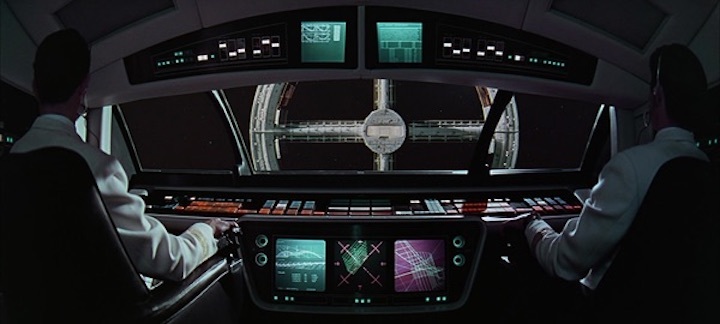
Fifty years ago today, April 2, 1968, the future started. Or maybe not. That was the day that Stanley Kubrick’s 2001: A Space Odyssey premiered in Washington, DC. At the time, movies did not premiere simultaneously on hundreds or thousands of screens. Instead, they sometimes rolled out, city by city, and Washington was the first American city to premiere the film. According to Gary Lockwood, who played astronaut Frank Poole in the movie, the Washington premiere did not go particularly well. A new book on the movie explains that audience members started “streaming” out of the Uptown Theater before the movie was even finished.
| 2001: A Space Odyssey still captures the imagination, even though we do not live in a future that those who were inspired by the film imagined. |
The next day the actors and other people associated with the movie hopped on an airplane to fly to New York City for the film’s debut there. Lockwood ended up sitting next to Arthur C. Clarke, who had written the short story that the movie was based upon and collaborated—not always amicably—with director Stanley Kubrick. Lockwood said that Clarke was in a gloomy mood because of the poor reception to the film in Washington. Lockwood told Clarke that he was incredibly lucky, because it was only then, at that precise moment in time, that the technology to realistically depict spaceflight and a director as skilled as Kubrick both existed to take Clarke’s story and turn it into something amazing. But the New York premiere did not go any better, and reportedly hundreds of people walked out of the theater before the film ended.
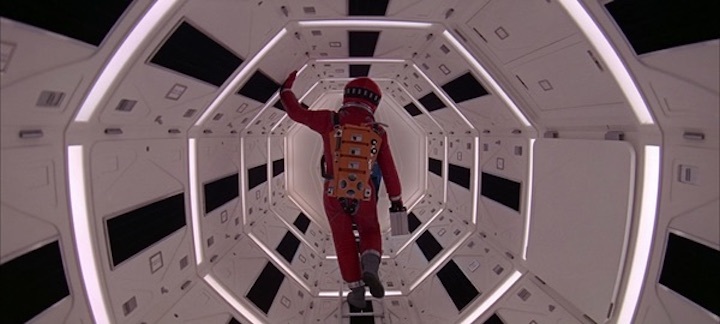
In retrospect, Lockwood was right to be optimistic, for 2001 went on to be regarded as a classic; a highly influential film. It will even appear on screens around the country again next month. Not bad for a movie that Clarke was initially depressed about and was frequently panned by critics when it first debuted in 1968. 2001: A Space Odyssey still captures the imagination, even though we do not live in a future that those who were inspired by the film imagined.
Lockwood and co-star Keir Dullea, who played astronaut Dave Bowman, have appeared together numerous times over the years to speak about the movie. During one joint appearance several years ago where Lockwood told that story of the premiere, Dullea said that he had his doubts about the movie and did not know it would be a classic—or even very good. In contrast, Lockwood said that he always believed in it. He said that he had a lot of faith in Kubrick and when he looked around at the sets and he read the script he was so impressed that he knew they were making something that would be remembered forever.

It has been half a century and yet 2001 still has a powerful hold on how we visualize spaceflight and how we conceive the future. The movie was incredibly influential in many ways and is probably the film with the greatest impact on America’s space program. You would be hard-pressed to find somebody who became an astronaut or a scientist because of other classic science fiction movies like Forbidden Planet, Star Wars, or Alien, but 2001 inspired many people who believed that the future was in space, even if Kubrick’s vision of it was antiseptic and cold and dehumanizing.
In 2014, the art book publisher Taschen released an expensive collectible book set devoted to 2001, and then a more affordable version of one of the books. A book on Harry Lange’s art design for 2001 came out soon after, and another making-of book by science writer Michael Benson has just been released (see “Review: Space Odyssey”, The Space Review, this issue), joining an extensive body of literature—my shelves hold at least five other similar books—about the creation of this monumental film.

The East Coast’s geek party Dragon Con occurs in Atlanta every Labor Day weekend, attracting tens of thousands of people. Keir Dullea (pronounced “duelay”) and Gary Lockwood appeared at Dragon Con in 2015 where they talked about their experiences making the film. Lockwood turned 81 in February and Dullea will turn 82 next month. Both men view the movie as one of the highlights of their careers. It is certainly the experience that they are both asked to speak about most regularly.
| Neither actor auditioned for their roles: they were simply offered them based upon their previous work. |
Both actors admired Kubrick when he cast them for the film, and despite the director’s mercurial reputation at the time, they really enjoyed working for him. They thought that he was polite, never yelled, was highly prepared, and was a collaborative director. They considered him a genius. Dullea had been impressed with Kubrick’s 1956 movie The Killing, and after seeing it in a theater he had specifically sought out the movie poster to learn who had directed it. But Kubrick had not rocketed to fame until 1960 when he directed Spartacus, a film that gave Kubrick serious clout in Hollywood but also convinced him that he needed total control of his projects. Lockwood was also a Kubrick fan and became all the more convinced of his genius upon seeing the sets and production design for 2001. Dullea said that he had been a science fiction fan since his youth and when he first read the script for 2001 he immediately recognized its origins in Arthur C. Clarke’s 1951 short story “The Sentinel,” which he had read as a teenager.
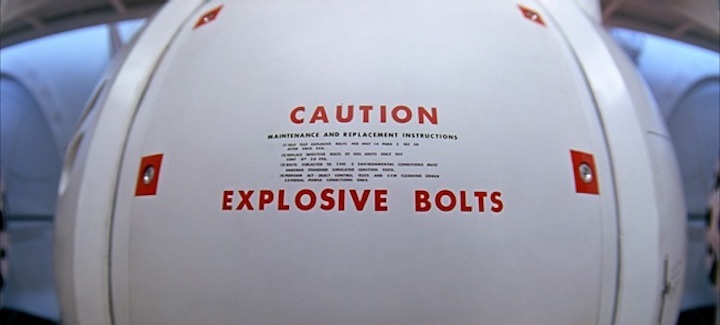
Neither actor auditioned for their roles: they were simply offered them based upon their previous work. Dullea said that the best directors are very good at casting actors who don’t require directing. This drew a chuckle from the audience, but Dullea explained that a good director picks exactly who he wants based upon a careful assessment of their abilities, and then doesn’t have to tell them what to do.
Both men told stories about their collaboration. For instance, at the end of the movie, when Dullea’s character is an old man, there is a series of transitions where he looks to see his older self. Dullea suggested that instead of his character simply looking over at the bed, they needed something to cause him to look in that direction. That’s where they came up with the idea of knocking the glass off the table and when he looks at it, he turns toward his oldest self on his death bed, just prior to his rebirth as the Star Child.
Lockwood told a story about how he had a difference of opinion with Kubrick about a scene. Shortly after shooting had ended for the day, one of the stagehands told him that Stanley wanted to see him in his apartment. Lockwood said he thought to himself, “Well, I’m going to get fired.” He walked over and knocked on the door and Stanley Kubrick let him in. Surprisingly, Kubrick said to him, “I heard you’re a Chopin fan. I have a new album you should hear.” He went over to a wall of albums and started to retrieve one. Lockwood was a little surprised but said, “Before we listen, let’s cut to the chase. Am I fired or not?” Kubrick replied no, he wasn’t firing him because of their dispute about the scene. He said that he had learned over the years that actors have knowledge and insights that directors don’t, so he was willing to hear what Lockwood thought. Lockwood felt it was a sign of Kubrick’s skills as a director that he did not let his ego prevent him from listening to his actors. So, they listened to Chopin.
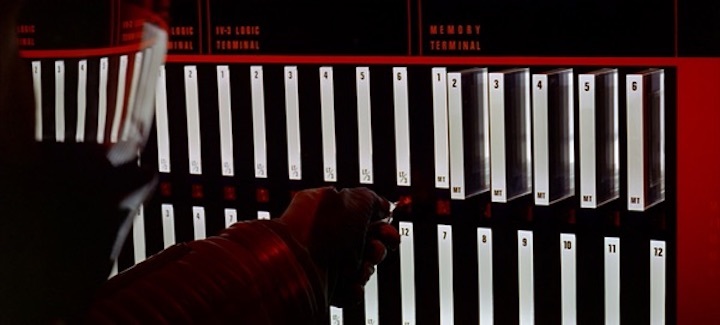
The actors also talked about the film’s lack of dialogue. They said that when they got hired for the movie they were given dossiers on their characters that explained their backgrounds. Astronauts Poole and Bowman were supposed to be super smart, with many academic degrees and extensive experience. But they were also on a mission that had been underway for over a hundred days, so when the film picks up with them in deep space, the two astronauts have been living together for months and pretty much said everything they’re going to say to each other unless it was work-related. They’re all talked out by that point, which is why they say almost nothing during the scenes on the Discovery.
| Lockwood implied that he had a low opinion of William Shatner, with whom he appeared in the second television pilot for Star Trek. Then again, in that episode the two men tried to kill each other, and Kirk succeeded. |
Dullea explained that he had a very technical and jargon-filled bit of dialogue to memorize. It was when the astronauts report the failure of the electronics unit to mission control. Dullea was worried he would not remember his lines, so he studied it again and again, driving himself nuts. Then he delivered it flawlessly on camera. In the end, it is nearly identical to the language used by mission control reporting back to Discovery, saying that they agree with his assessment of the problem, so Kubrick cut Dullea’s scene. But Dullea said that he still remembered it perfectly, nearly fifty years later. And then he delivered the very long bit of jargon-laden dialogue and got a laugh and applause from the audience.
Lockwood also said that they got to meet the Apollo 11 crew and then he paused and said “I liked Neil… I don’t like Buzz.” He implied that he had a similar low opinion of William Shatner, with whom he appeared in the second television pilot for Star Trek, playing Kirk’s best friend. Then again, in that episode the two men tried to kill each other, and Kirk succeeded.
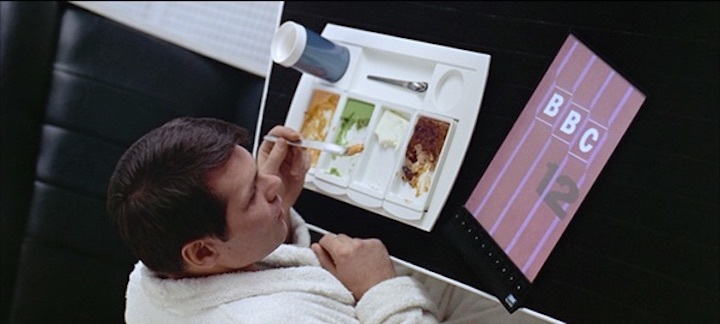
Lockwood also told a story about working on the centrifuge set, which he thought was brilliantly designed. He joked that he realized that Kubrick hired him for the job because of his previous experience as a cowboy stuntman. One day Lockwood found himself strapped into his chair, eating goop from his food tray—upside down. Keir Dullea was supposed to climb down the ladder at the center of the set and then the whole set would rotate as he walked over to where Lockwood was sitting. Kubrick called “action” and told Lockwood to take a bite, and Lockwood then watched as the three squares of goop slowly peeled off his tray… and fell nearly 70 feet to the floor below, splattering everything on the pristine white set. They didn't shoot for the rest of the day.
The actors took some questions from the audience and had some surprising answers. For instance, somebody asked if they knew that the film would be a classic. Dullea said that he had his doubts because the early reviews were so poor. In particular he mentioned film critic Pauline Kael’s infamous devastating review, where she referred to 2001 as “monumentally unimaginative.” Kael didn’t like Kubrick’s films (she hated Dr. Strangelove, for example), but later recanted upon seeing 2001 a second time. Kael may have revised her opinion, but 2001received numerous other lackluster and even harsh reviews.
| Dullea said that he had his doubts because the early reviews were so poor. In particular he mentioned film critic Pauline Kael’s infamous devastating review, where she referred to 2001 as “monumentally unimaginative.” |
Considering that 2001 was released way behind schedule and over budget, expectations had been high, and presumably many critics were waiting to pounce. But the initial film shown in Washington and New York was also longer, which might have affected the audience reception to what was already a slow film. After the negative response in the premier cities, Kubrick edited out almost twenty minutes of the movie. In more recent decades it became common to re-release “director’s cuts” of movies, but Kubrick never indicated that he wanted those scenes restored and seems to have been happy with his revised edit.
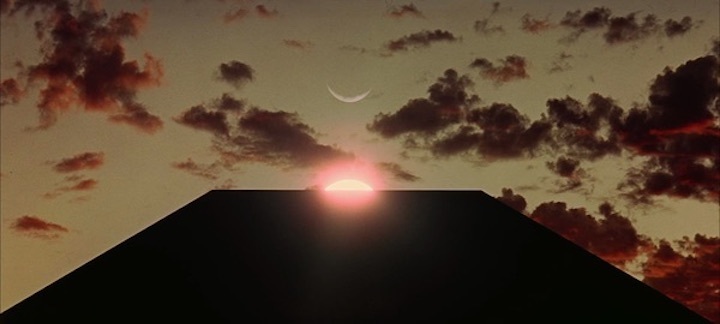
Dullea and Lockwood have done many joint appearances over the years, but one question from the audience prompted a response from Dullea that surprised Lockwood. An audience member asked if either actor would change anything about their performances. Dullea said no, that he thought that his performance was perfect and the film was perfect. Lockwood seemed genuinely surprised that he had never heard Dullea say that before, and said he agreed with him: he wouldn’t change a thing.
Quelle: The Space Review
